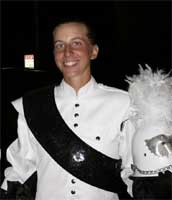Last week, I confessed that I only marched half of last summer. This week, I'll give you a glimpse into life on the sidelines.

But most importantly, this experience has given me a "reality check." I know that I cannot take a single experience for granted, because in the end, this organization is much larger than myself. Phantom Regiment doesn't "need" me -- it did quite well before I was here, and it will continue to do well long after I'm gone. As much as I like to think that nobody could ever march my spot as well as I can, this past summer I was proven wrong. I'll admit it: It was a shot to the ego to see the corps continue to progress, while I was left behind. The world did not end for Phantom Regiment on the day that I pulled myself from the drill. But because of this experience, I appreciate my time with this corps so much more. I know that it truly is an honor to stand with this horn line, and wear this uniform. You can be sure that I will work harder than ever before, so that I can truly say that I was a part of the 2005 Phantom Regiment.

Lanah Kopplin
But most importantly, this experience has given me a "reality check." I know that I cannot take a single experience for granted, because in the end, this organization is much larger than myself. Phantom Regiment doesn't "need" me -- it did quite well before I was here, and it will continue to do well long after I'm gone. As much as I like to think that nobody could ever march my spot as well as I can, this past summer I was proven wrong. I'll admit it: It was a shot to the ego to see the corps continue to progress, while I was left behind. The world did not end for Phantom Regiment on the day that I pulled myself from the drill. But because of this experience, I appreciate my time with this corps so much more. I know that it truly is an honor to stand with this horn line, and wear this uniform. You can be sure that I will work harder than ever before, so that I can truly say that I was a part of the 2005 Phantom Regiment.
Lanah Kopplin is a third-year euphonium player in the Phantom Regiment, and previously spent a year with the Pioneer. Lanah recently graduated from the University of Wisconsin (she's a Milwaukee native) with a political science degree, and will age out in 2005.


